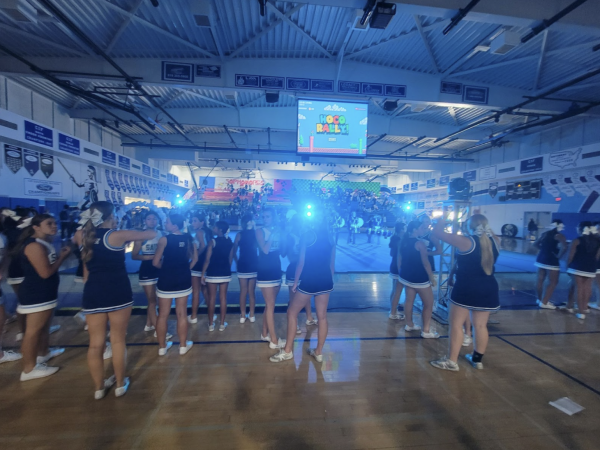Censorship or Protection: Hart District’s Pause on Classic Books
This year, the Hart District has put a pause to many beloved classic literature books due to the racial slurs and stereotypes portrayed.
For many years, Hart District students have been reading beloved classics like, Of Mice and Men, Huckleberry Finn, and To Kill a Mockingbird. These books are not being taught throughout the Hart District this year and whether they will make an appearance in next year’s curriculum is still uncertain.
In an interview with Saugus English teacher, Andrea Molina, she explained that even though these books’ messages are against racism, many of them have racist depictions of African Americans and there is a constant use of racial slurs. She also stated that students could be damaged by having these racial slurs presented in a classroom or having these words thrown at them outside school.
Molina explained that as a woman of Latina descent, she would prefer to have books written by women, different cultures, races, and ethnicities taught in the Hart District: “Even though Huckleberry Finn and To Kill A Mockingbird have great value to them, it is important for students to read literature with different perspectives.”
Currently, there is a committee working on the new standards for books that will be taught in the Hart District. If a book should not fall under the guidelines, then the book will not be taught. English teacher, Vilo Del Rio, is a member of the committee who explains “Various teachers from different schools high schools and junior highs are really doing a good effort in wanting to incorporate many voices into this situation. They have parents, students, and district personnel.” Although the criteria has not been created yet, the voices of many members of the Hart District are being heard to construct it.
During interviews, both teachers shared their opinion on the pause of these classic books. Molina agrees with the pause on teaching these books because many of her students have experienced racism and have been named under the racial slurs that are constantly said throughout the books. She explains “The repetition of the n-word can be damaging to students,” which is why Molina stopped having her students read Huckleberry Finn years ago.
When asked if the book pause was an act of censorship, she replied “The intention is not to censor, but to protect students and those who are experiencing racism in the classroom.” Although Molina agrees with the pause on these books, she believes that Huckleberry Finn and To Kill A Mockingbird are classic books with great messages for young adults. Her opinion clearly states that books that are taught in the Hart District should come from diverse perspectives of a variety of people.
On the other hand, Del Rio does not agree with the “book ban” and considers it as an act of censorship to a specific point: “It’s censored to a certain extent. It’s not an absolute censorship and I don’t think it’s a permanent censorship, but this year every freshman in the Hart District will be robbed from being taught from these masterpieces that actually teach the ugliness and injustice of racism. Skilled teachers have used these books to emphasize the importance of diversity and acceptance. As a Latino myself, I find it tragically ironic that no freshman this year will have these life-changing literary experiences with these masterpieces.” Del Rio believes that books with more diverse authors should get recognition in the Hart District curriculum, but getting rid of students To Kill A Mockingbird, Of Mice and Men, and Huckleberry Finn should not be taken out of the classroom in order to do so.
Although Del Rio believes this is an act of censorship, he doesn’t believe that this is the intention of the Hart District: “I don’t believe they are blind since they’re not permanently censoring […] and then we will see if it will continue to be a book that is censored for students.” Del Rio claims that the books have not completely been taken out of schools. Therefore, it isn’t entirely an act of censorship.
Even though students are not able to read these classic works of literature in the classroom, they are available in libraries in schools throughout the Hart District. In the future, students may not be reading Huckleberry Finn, To Kill A Mockingbird, or Of Mice and Men in the classroom but the District is not planning on removing these books from school libraries. Although there are many perspectives about the “book ban,” these collective works will be valued for years to come and can still be read by any student who has the desire.











Kendall Robinson • Mar 23, 2021 at 3:08 pm
I don’t understand why it is necessary to specifically offer books by authors that are women, different races, etc because when you read a book, you’re not just reading it because of the skin color of the author. Having students read books by authors that are of color instead of authors that are White is directly discriminatory. Plus, this would mean, that by “banning” books like To Kill A Mockingbird, you’re specifically cutting down on books by White authors just to replace them with authors of color, which is illogical (and actually somewhat racist) because the color of the skin of the author should be 100% irrelevant when reading a book. Otherwise, you’re literally discriminating against the author because of their personal and physical features. Why prefer curriculum to include books by women instead of books by men? That doesn’t make any sense, because the gender of a person should not matter when reading a book. Also, the skin color of the author has nothing to do with the character’s perspective in the book (since perspective was mentioned in the article) unless it’s in first person point of view, because apparently people in favor of this censorship are failing to differentiate between the author of a book and the characters and characters’ actions/words/ideas in a book. The idea of banning these famous, well written and knowledgeable books from schools is absolutely ridiculous. Of course, racial slurs are terrible and shouldn’t ever be used toward people, but if there are racial slurs in books, they are probably being used by the author to prove a point or an idea, and in these books, are mainly used to promote inclusiveness and the absolute opposite of the prejudices of racism. But by cutting down on books by White authors just to replace them with books by authors of color, simply because they are authors of color, defeats the purpose of being “inclusive,” which is kind of the point, since that would be literally excluding authors because they’re white. I truly hope that the new “standards” for books in Hart District don’t obviously discriminate against people/authors based on their skin color or gender, like trying to exclude White authors or male authors just because they’re white or male, or their books, just because they present real issues like racism, that are presented through racial slurs. I also hope that by choosing new books, if that happens, the district does not specifically look for new books based on gender, race, etc, but by the message, quality, and value of the book. Having books read by students that were written by authors of color or of a different race or gender is obviously not a problem, but this censorship does become an exclusive problem when you try to knock down and censor books that are classic pieces of literature, by authors that happen to be White or male, for that reason. The article also mentioned a teacher’s preference for more books written by women (which I disagree with) in schools, so why not keep To Kill A Mockingbird..? That’s written by Harper Lee, and the slurs in that book are not used in a racist manor, but to prove an anti-racist point. Don’t censor these books, Saugus.